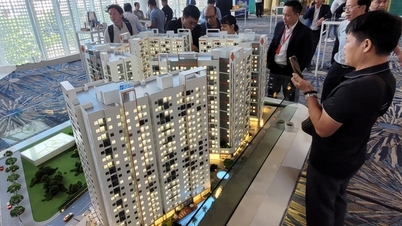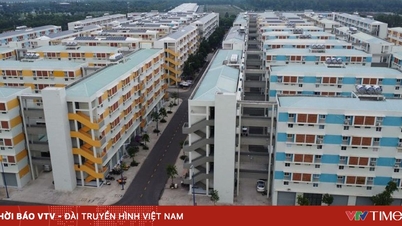Discussing this issue, many experts say that this is a solution that "does more harm than good".
Economist Dinh Trong Thinh analyzed that the application of real estate price ceilings will pose many risks. Among them, the most worrying issue is the possibility of forming an "underground" market.
" When the price ceiling is rigidly regulated, many transactions will take place outside of official contracts to avoid regulations. This not only causes legal risks but also reduces the transparency of the real estate market ," Mr. Thinh warned.
Besides, according to Mr. Thinh, the ceiling price will not be able to reflect the diversity and characteristics of the projects. An apartment in the city center cannot have the same price as an apartment in the suburbs, even if it has the same area. Applying the ceiling price - floor price easily leads to the situation where projects in the center are priced lower than their real value.
Therefore, if we apply a price ceiling, we must build a flexible policy that can help control the market and ensure the interests of the participants. Specifically, instead of applying a fixed price, we should build a price range based on location, amenities, and construction quality.

Experts say that applying a real estate price ceiling is a method that "does more harm than good". (Illustration: Minh Duc).
Sharing the same view, Mr. Nguyen Quang Huy - CEO of the Faculty of Finance and Banking of Nguyen Trai University (NTU) also said that applying a price ceiling can help curb speculation but brings more risks than benefits.
Because this goes against the principle of free market, real estate prices are governed by supply and demand. When applying ceiling prices, supply is easily tightened, while floor prices make the low-cost segment lose competitiveness.
Besides, the real estate market is very diverse, from townhouses, apartments, land to resort projects. It is impossible to set a common price for each type.
" The price ceiling also makes it difficult for investors to optimize profits, reducing the motivation to implement new projects. When the price ceiling is too low, underground transactions will arise, leading to a lack of transparency that distorts the market. In addition, investors will also stop developing the high-end segment or high-value projects if profits are limited, limiting market supply ," Mr. Huy emphasized.
Therefore, according to Mr. Huy, instead of fixing selling prices, the market needs more fundamental solutions to solve the root causes of high real estate prices such as: Increasing the supply of affordable housing and social housing by speeding up legal procedures, streamlining project approval steps, and reducing licensing time.
Besides, the State needs to support taxes and preferential loans for investors developing the social housing segment.
Economist Dr. Vo Tri Thanh also said that applying price ceilings to real estate is not new but always causes controversy. Its advantages are to control price fever, increase transaction transparency and limit "price manipulation", similar to the effect on the stock market.
However, if not careful, this mechanism can be counterproductive, distorting the market. Accordingly, if the ceiling price is set too low compared to the real market value, investors will no longer have the motivation to implement new projects. This leads to a shortage of housing supply in the market or projects with selling prices close to the ceiling price.
“ The price ceiling may cause investors to lose motivation to develop new projects, or reduce construction quality to optimize profits ,” Mr. Thanh said.
Mr. Giang Anh Tuan, Director of Tuan Anh Real Estate, stated his opinion: Applying real estate price ceilings is difficult to implement because it cannot interfere with the business operations of enterprises.
To build a project, businesses spend a lot of money from procedures to construction. With the current real estate price level, it is impossible to develop low-priced apartment projects in Hanoi and Ho Chi Minh City.
Even in projects in the suburbs of Hanoi, prices range from 50 to 70 million VND/m2, so if an inappropriate ceiling price is applied, investors will not be able to ensure profits even with policies to reduce land use fees and land rents.
“ If the ceiling price is set too low, investors can only carry out projects in the provinces surrounding Hanoi. In the central districts of Hanoi, the construction cost of many affordable projects has reached tens of millions of VND/m2, ” said Mr. Tuan.
To cool down housing prices, according to Mr. Tuan, it is necessary to promote administrative reforms to increase housing supply, especially social housing. In addition, it is necessary to strictly control speculation and provide financial support for first-time home buyers.
Source



![[Photo] General Secretary To Lam receives Slovakian Deputy Prime Minister and Minister of Defense Robert Kalinak](https://vphoto.vietnam.vn/thumb/1200x675/vietnam/resource/IMAGE/2025/11/18/1763467091441_a1-bnd-8261-6981-jpg.webp)







































































































Comment (0)